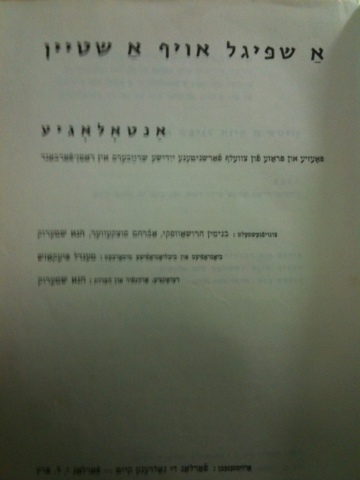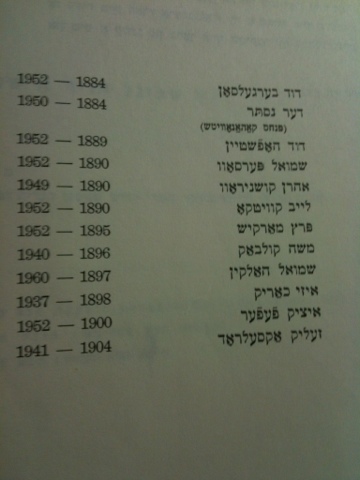Modernist poet Perets Markish was among those executed in 1952. One of his most famous poems is Brokhshtiker (Shards.) From Brokhshtiker comes the image of a shpigl af a shteyn, a mirror on a stone. Shpigl af a shteyn is also familiar to students of Yiddish literature as the title of the most important anthology of Soviet Yiddish writing.
Here's the title page of my very old copy:

And the list of authors found within:
For this year's August 12th commemoration, Australian animator Jack Feldstein created a short film set to Brokhshtiker. Feldstein uses a technique he calls 'neonizing' which is "a combination of live action video recording and public domain material..." The result, with Yiddishist Shane Baker reciting the words of the poem, is a beautiful new interpretation of Markish and his poetry.


Some recommendations for reading if you have this anthology, based on my own preferences and conversations with Eugene Orenstein:
ReplyDeleteMarkish – Maestoso patetico, p. 429; Golel, p. 433 (interesting in light of the anti-Zionist tack most would have to adopt later); Eyfl-tur, pp. 434-5 (Yiddish sonnets, sorta!); Ho Lakhmo + [brokhshtiker], pp. 487-489 ([brokhshtiker] is a piece, oddly enough, of this larger poem, which follows many of the themes of Maestoso patetico, but with more history-water under the bridge, or more history wreckage behind Benjamin's angel).
Kulbak - In a Yadlovn vald, p. 521 (keep in mind that Harkavy has typos: yadlovn means "of FIR [trees]", not "of FIRE [sic]"); Asore debraye, p. 529 (try to figure out why that's the guy's name!); Raysn, p. 530-;
Halkin - Rusland, p. 572; Ven vet vern likhtik, p. 608
K, that's it for now. Have fun, kids!